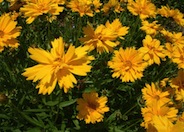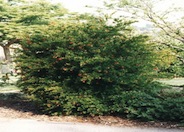
Common name:White Birch, European White Birch
Botanical name:Betula pendula
This medium-size weeping tree will grow to about 40' tall and has a whitish/brown bark with deciduous green leaves.

Common name:Mexican Bush Sage, Velvet Sage
Botanical name:Salvia leucantha
The Mexican Sage is a bushy shrub that grows 3'-4' tall and wide. It has hairy white stems, gray green leaves and velvet-like purple flower spikes that bloom summer through fall. This shrub tolerates sun, light shade, little water, and is hardy to 15 degrees F. The Mexican Sage is drought tolerant and attracts hummingbirds. -Cornflower Farms

Common name:Lamb's Ears
Botanical name:Stachys byzantina
This tiny, herbaceous shrub will grow less than 1' tall and has medium sized, grayish green leaves with blue and lavender flowers that bloom in the spring.

Common name:California Field Sedge
Botanical name:Carex praegracilis
This native Carex can be successfully used as a lawn substitute but requires significant water to obtain good coverage. Once coverage is reached, water can be reduced and maintenance is close to zero. Unmowed, the plant can be used effectively in a variety of conditions and will reach a height of 6" or under and spreads up to 2' by rhizomes.

Common name:Double Sunburst Coreopsis
Botanical name:Coreopsis grandiflora 'Double Sunburst'
The 'Double Sunburst' is a wonderful cultivar and a showy, Southern U.S. native. Golden yellow, double flowers on 2' bushy plants bloom from June to September in full sun and average to dry soils. It makes for good cut flowers, and pruning keeps the plants abundant with blooms. -Holland WIldflower Farm

Common name:Dwarf Pomegranate
Botanical name:Punica granatum 'Nana'
This shrub is highly ornamental with dense foliage. It can reach 3' tall and 6' wide. It is easily pruned and shaped, thus its popularity as a bonsai plant. Flowers are small, showy, and red orange, developing into dry red fruit (not edible). It is considered evergreen in mild frost-free winter areas. This shrub is great in containers. It needs extra summer water in hot inland valleys.
The Right Plant Right Place
Putting the right plants in the right places in the right groupings is both the challenge and art of good landscape design.
Click in the green box for more information
| Designer: | Looking Through the Foliage |
Photographer: GardenSoft |
Soils and Compost:
Maintain a two to four inch layer of mulch on the soil surface to reduce weeds, infiltrate rain water, and reduce compaction.
Integrated Pest Management:
Remove irrigation water and fertilizer from areas where you don't want weeds to grow.

